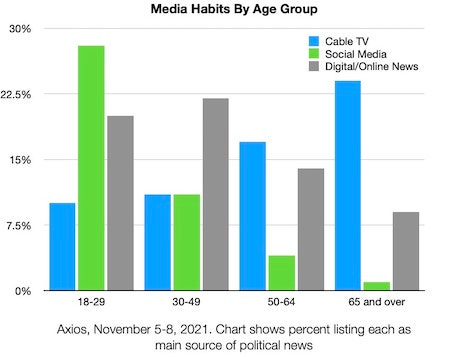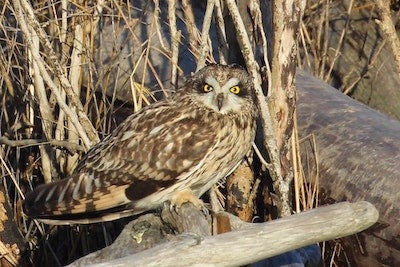The Weird Times: Issue 89, January 23, 2022 (V2 #37)
If you are not a myth, whose reality are you? and if you are not a reality, whose myth are you? —Sun Ra
“When another person makes you suffer, it is because he suffers deeply within himself, and his suffering is spilling over. He does not need punishment; he needs help. That's the message he is sending.”—Thich Nhat Hanh
Kinship
Very slowly burning, the big forest tree
stands in the slight hollow of the snow
melted around it by the mild, long
heat of its being and its will to be
root, trunk, branch, leaf, and know
earth dark, sun light, wind touch, bird song.
Rootless and restless and warmblooded, we
blaze in the flare that blinds us to that slow,
tall, fraternal fire of life as strong
now as in the seedling two centuries ago.
—Ursula LeGuin
“In 1963, Tracy Sugarman asked my parents if he could take me to a picnic with them in Stamford (Connecticut). I had a Minox “spy” camera and took it with me everywhere, and so glad I did, because we ended up at Jackie Robinson's house with food, music, and a speech by MLK.” —Miggs Burroughs
Woodland Pattern's 28th Annual Poetry Marathon & Benefit will take place on Saturday, January 29th and Sunday, January 30th. Sign up for the broadcast. My time slot is 8-9 pm on Sunday.
Discoveries
The only hope is that this moment in history
Looks the same in both timelines of what the end could be
Whether this the infection risin' up and we fight and quell
Or if it outscraps us and humanity just dies and fails
It was always gon' get worse 'fore it got better
Racism was never gon' go quietly to the night
It never will but I do believe that it along with greed
Can make it's way out of our institutions so that all are free one day —Marlon Craft, from State of the Union (January 2021)
Welcome to the repercussions, possibly the end, and we
Finger-pointing to avoid that we are all enemies
What if instead of pretending
We harnessed that fight and that fuel to be all that we pretend to be
There’ll always be waiting if you waiting till you ready, B
I’m looking in the mirror like, “When you gon’ set you free?” —Marlon Craft, from State of the Union 2 (January 2022)
(Ed. Note: Listen to both these incredible raps. Read the lyrics. Then tell me what you think.)
Brian Eno on NFTS and Automaticism, "NFTs seem to me just a way for artists to get a little piece of the action from global capitalism, our own cute little version of financialisation." —The Crypto-Syllabus
Geraldine Juárez on NFTs & Ghosts, "The idea that decentralization of infrastructure equals decentralization of power is a trap that became evident to many around 2013-2014, when net politics and networked activism was at its strongest in Europe."--The Crypto-Syllabus
Crypto and the politics of money, Adam Tooze, Chartbook, 1/22/22: “To paraphrase Gramsci, crypto is the morbid symptom of an interregnum, an interregnum in which the gold standard is dead but a fully political money that dares to speak its name has not yet been born. Crypto is the libertarian spawn of neoliberalism’s ultimately doomed effort to depoliticize money.”
A DeFi crash course for normies: Crypto markets since 2017, Ming Zhao, Noahpinion, 1/22/22: “What the hell’s going on?? you think. All these buzzy meme-words, the gravity-defying pumps, the WAGMI-defying dumps… is it all just ponzi economics (again) or is the opportunity “real” this time to rewrite our global financial system?” (Ed.Note, this is a great piece if you are wondering about crypto, W3 and the future or money in a connected world.)
What to Expect in Neuroscience, Genetics, Longevity, Biotech, and Psychedelics in 2022, Jane Metcalfe, Neo Life, 1/20/22, “Our question was simple: What is the most exciting, impactful, or scary development you’re anticipating in 2022 in your field? We’re blown away by their responses.”
I can only promise you that it's going to get weirder: Technology is always changing the nature of human life, Noah Smith, Noahpinion, 1/19/22: “Technology isn’t becoming weird; technology has always been weird. In fact, in a very deep sense, that’s what technology does — by increasing human capabilities, it changes the fundamental shape of human life.”
Gaming Giant Unity Wants to Digitally Clone the World: The company is leveraging its technology to help clients make “digital twins”—virtual copies of real-life objects, environments, and even people, Cecilia D’Anastasio, Wired, 1/19/22
From Fertilizer to Fuel: Can ‘Green’ Ammonia Be a Climate Fix? Ammonia has been widely used as a fertilizer for the last century. Now, using renewable energy and a new method for making ammonia, researchers and entrepreneurs believe “green” ammonia can become a significant clean fuel source for generating electricity and powering ships, Nicola Jones, Yale Environment 360, 1/20/22
Superstores can meet half their electricity needs with rooftop solar, says a new report: From Walmart to Ikea, a report finds that the rooftops of big-box stores offer enough solar potential to power the equivalent of 8 million American homes, Tik Root, Washington Post, 1/21/22
This 22-Year-Old Builds Chips in His Parents’ Garage: Sam Zeloof combines 1970s-era machines with homemade designs. His creations show what’s possible for small-scale silicon tinkerers, Tom Simonite, Wired, 1/20/22
The US Inches Toward Building EV Batteries at Home: In an effort to reduce dependency on hard-to-source cobalt and Chinese manufacturing, US makers are finally getting into the cathode business, Gregory Barber, Wired, 1/18/22
We Are One Step Closer to Incredibly Compact, Powerful Quantum Batteries: The bigger a quantum battery, the faster it charges, Chris Young, Interesting Engineering, 1/17/22
New sensor grids record human brain signals in record-breaking resolution: High-resolution recordings of electrical signals from the surface of the brain could improve surgeons' ability to remove brain tumors and treat epilepsy, and could open up new possibilities for medium- and longer- term brain-computer interfaces, UC San Diego, EurekAlert, 1/19/22
With $3 billion, Hal Barron and other biotech veterans launch a disease ‘reversal’ company, Matthew Herper, StatNews, 1/19/22
Wearable air sampler detects personal exposure to SARS-CoV-2, Yale School of Public Health, 1/18/22: “The Fresh Air Clips are easy-to-use, non-invasive, and low-cost.”
‘Like witnessing a birth in a morgue’: the volunteers working to save the Joshua trees: If carbon emissions stay at current levels, just 0.02% of the desert tree would survive. Volunteers are now banding together to plant seedlings, Max Ufberg, The Guardian, 1/20/22
California city finds a creative way to conserve water: Healdsburg residents used treated wastewater for trees and bushes around their homes, YCC Team, Yale Climate Connections, 1/18/22
These machines scrub greenhouse gases from the air – an inventor of direct air capture technology shows how it works, Klaus Lackner, The Conversation, 1/18/22
Old Climate Clues Shed New Light on History: Historians are reexamining eras of social turmoil and linking them to volcanic eruptions, prolonged droughts, and other disturbances in the natural world, Jacque Leslie, Wired, 1/15/22
A Return to Native Agriculture: Indigenous farming and ranching practices are once again being embraced in an American West stressed by drought, diminishing resources, and climate change, Anne McNulty, Civil Eats, 1/21/22
Satellite Observations Enhanced with Inuit Knowledge Chart a Changing Arctic: By incorporating traditional ecological knowledge into how he interprets satellite imagery, this scientist is giving his community sea ice news they can use, Chris Baraniuk, Hakai, 1/17/22
Words, What Holds Them Close
The Complicated History of the Black Joke, the Ship That Battled the Slave Trade: The Ongoing Repercussions of the Transatlantic Slave Trade, A.E. Rooks, LitHub, 1/21/22: “Regardless of which side of the Atlantic we live on, the reverberations of centuries of human trafficking and the turbulent decades encompassing the fight to finally end it are still felt now; it is in reading and writing about escaping the slave trade that one realizes that the legacy of the slave trade and its abolition is yet inescapable.” The Black Joke: The True Story of One Ship’s Battle Against the Slave Trade
Zora Neale Hurston on What White Publishers Won’t Print: And How “Public Indifference” Reinforces the Status Quo, Zora Neale Hurston, LitHub, 1/20/22: “Argue all you will or may about injustice, but as long as the majority cannot conceive of a Negro or a Jew feeling and reacting inside just as they do, the majority will keep right on believing that people who do not look like them cannot possibly feel as they do, and conform to the established pattern.” You Don’t Know Us Negroes and Other Essays
How Film-Comedy Pioneer Buster Keaton Shaped TV—And I Love Lucy: In an adaptation from her new book, Camera Man, the author examines the comic icon’s forgotten role in the emerging medium called television, Dana Stevens, Vanity Fair, 1/20/22
What the Kids Are Reading: Engaging with the new generation and its media consumption, Paul Musgrave, Systematic Hatreds, 1/18/22: “Senior citizens live in a world of cable television and even print. Middles live in a world of transition. Yutes live in a post-TV, post-print world of digital sources.”
Op-Ed: You may not know his name, but for me Eric Priestley was a poet laureate of L.A., Erin Aubrey Kaplan, LA Times, 1/18/22: “To support his writing, he was a bricklayer, a handyman, occasionally a writing teacher. He stayed close to his fellow Watts Writers alums — the poet Ojenke, the writer and professor Quincy Troupe and Kamau Daáood, who co-founded the World Stage in Leimert Park — but he wasn’t a “community” figure. He was simply too busy trying to figure it all out for himself.”
“I was born dead. Once when the sun was young about eleven thousands years ago during an eclipse, I came out right down there on the African ground inside a shadow cast by the Staff of Oranyan in the village of Ile Ife. My mother died after thirteen hours of labor.” —Eric Priestley (from For Keeps)
Rhetoric and Rhyme: On Rap, Daniel Levin Becker, Paris Review, 1/18/22: “Rap music serves, consistently, contagiously, sometimes in spite of its own claims to the contrary, as a delivery mechanism for the most exhilarating and crafty and inspiring use of language in contemporary American culture.”
Nick Cave on Creativity, the Myth of Originality, and How to Find Your Voice: “Your imagination… is mostly an accidental dance between collected memory and influence… a construction that awaits spiritual ignition,” Maria Popova, The Marginalian, 1/23/22
What’s the Deal, Hummingbird?, Arthur Krystal, New Yorker, 1/17/22: “He remembered dropping acid on Martha’s Vineyard and asking everyone who Martha was. No one knew. He remembered the last woman he had slept with. She had been sixty-two. How strange was that?”
Does Talent Matter? Of course, but also, not really, John Warner, The Biblioracle, 1/23/22: “Sometimes I think it would be simply more comforting to believe in genius, that art is the byproduct of exceptionally gifted people who throw off their works like Zeus birthing Athena from his forehead. That way, I’d be off the hook as a writer, reader, and teacher. My job would be merely to sort the brilliant from the ordinary and sit back and let them go.”
Norton Lecture 6: Birds | Laurie Anderson: Spending the War Without You, Laurie Anderson, Mahindra Humanities Center, 12/16/21: “Birds is the final in a series of six lectures, looking at the challenges we face as artists and citizens as we reinvent our culture with ambiguity and beauty. This talk will consider the future.”
Yeah, Birds
Bald eagle rebound stunted by poisoning from lead ammunition, Krishna Ramanujan, Cornell Chronicle, 1/13/22
Owl wing design reduces aircraft, wind turbine noise pollution: Serrated edge of owl wings makes them quieter than other birds, can help inform airfoil designs, American Inst of Physics, EurekAlert, 1/19/22: “"Nocturnal owls produce about 18 decibels less noise than other birds at similar flight speeds due to their unique wing configuration.”
Short-eared owls are one of the most well-traveled birds, Stan Tekiela, SW News, 1/19/22: “One thing that isn’t short on these owls are the wings. They have long broad wings which when they fly, they look like butterfly wings flapping.”
This Wonder Bird Flies Thousands of Miles, Non-Stop, as Part of an Epic Migration: The more scientists learn about the Hudsonian godwit, the more they’re amazed—and worried, Jim Robbins, Smithsonian, 1/22
Birds consume insects, so tracking insect populations can help understand birds too: EntoGEM: a community-driven systematic mapping project to build a global evidence map of insect population and biodiversity trends, project coordinated by Eliza Grames and Graham Montgomery.
The ticking continues…
America must take steps now to avoid a slide into authoritarianism: Without robust federal legislation, it will soon be impossible to stop America’s degeneration into a diluted pseudo-democracy, Thomas Zimmer, The Guardian, 1/19/22
Abolishing the filibuster won’t lead to a ‘tyranny of the majority’. It’s quite the opposite, Jan-Werner Müller, The Guardian, 1/22/22: “What defenders of the filibuster want is minority rule – and a government unable to deliver anything meaningful to its people.”
How Things Will Get Better for Biden and the Dems: We can count on Trump to seize defeat out of the jaws of victory, Robert Kuttner, American Prospect, 1/21/22
Is Ginni Thomas a Threat to the Supreme Court? Behind closed doors, Justice Clarence Thomas’s wife is working with many groups directly involved in controversial cases before the Court, Jane Mayer, New Yorker, 1/21/22: “The reason we use an appearance test is because we say the appearance of justice is as important as the fact of justice itself.” (Steven Gillers). (Ed. Note: Justice Thomas should step down. Now.)
Eighty percent (80%) of voters favor requiring voters to show a photo ID before casting a ballot, Scott Rasmussen, Ballotpedia, 1/19/22
If Democrats want to win, they must change the venue, Jennifer Rubin, Washington Post, 1/16/22: “Yes, Democrats will have to overcome voter suppression and gerrymandering. But that does not mean they are incapable of winning more statewide races, firing up and expanding their base, making headway in state courts and enlisting popular support for voters to maintain control over politicians (not the reverse).”
‘The walls are closing in’: Trump reels from week of political setbacks: It was a terrible seven days, with major developments in investigations of his election lies and the Capitol riot reaching into his inner circle, Richard Luscombe, The Guardian, 1/23/22
How Thich Nhat Hanh taught the West about mindfulness, Arthur C. Brooks, Washington Post, 1/23/22: “‘Breathing in, I see that this body is not me. Breathing out, I am not caught in this body. I am life without limit. I have never been born and I will never die.’ The man who taught this, the Vietnamese Buddhist monk Thich Nhat Hanh, has died at age 95.”
Birthdays of note:
Louis Zukofsky, January, 23; Edith Wharton, January 24; Gloria Naylor and Virginia Woolf, January 25; Jules Feiffer, January 26; Julius Lester, January 27; Colette, January 28; Thomas Paine, January 29.
An objective – nature as creator – desire for what is objectively perfect
Inextricably the direction of historic and contemporary particulars
— from “A”-6, Louis Zukofsky
Recommended Reading
Thich Nhat Hanh: Essential Reading
The House of Mirth, Edith Wharton
Stories My Grandmother Told Me, Gabriela Maya Bernadett
The Poem of a Life: A Biography of Louis Zukofsky, Mark Scroggins
The Women of Brewster Place, Gloria Naylor
Let’s Talk About Race, Julius Lester
“And so, at the end of Biden’s first year—a year that by any standard must be called a success—Republicans are at the verge of achieving, at least for now, the end of the liberal democracy Americans have enjoyed since FDR and the Democrats embraced it in the 1930s, instead eroding the federal government and turning power over to the states.”—Heather Cox Richardson, Letters from an American, 1/22/22
The times do get weirder by the day. A bizarre mixture, as most issues of this newsletter portrays every week, of disasters and discoveries, heartbreak, sorrow, and joy. Most recently, there have been any number of articles about the mental health challenges to Americans, and for good reason. But there is so much we can do to overcome fear and anxiety, as Thich Nhat Hanh reminded us: “Fear keeps us focused on the past or worried about the future. If we can acknowledge our fear, we can realize that right now we are okay. Right now, today, we are still alive, and our bodies are working marvelously. Our eyes can still see the beautiful sky. Our ears can still hear the voices of our loved ones.”
I hear those voices now. Love to all. — David







